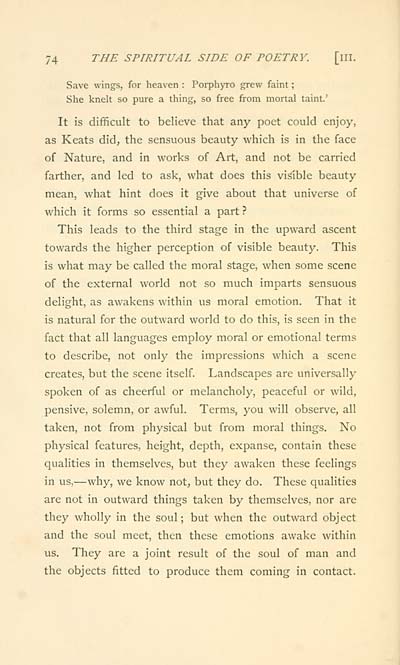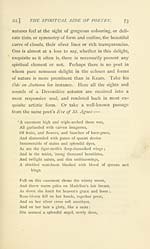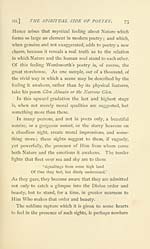Download files
Complete book:
Individual page:
Thumbnail gallery: Grid view | List view

74 THE SPIRITUAL SIDE OF POETRY. [ill.
Save wings, for heaven : Porphyro grew faint ;
She knelt so pure a thing, so free from mortal taint.'
It is difficult to believe that any poet could enjoy,
as Keats did, the sensuous beauty which is in the face
of Nature, and in works of Art, and not be carried
farther, and led to ask, what does this visible beauty
mean, what hint does it give about that universe of
which it forms so essential a part ?
This leads to the third stage in the upward ascent
towards the higher perception of visible beauty. This
is what may be called the moral stage, when some scene
of the external world not so much imparts sensuous
delight, as awakens within us moral emotion. That it
is natural for the outward world to do this, is seen in the
fact that all languages employ moral or emotional terms
to describe, not only the impressions which a scene
creates, but the scene itself. Landscapes are universally
spoken of as cheerful or melancholy, peaceful or wild,
pensive, solemn, or awful. Terms, you will observe, all
taken, not from physical but from moral things. No
physical features, height, depth, expanse, contain these
qualities in themselves, but they awaken these feelings
in us, — why, we know not, but they do. These qualities
are not in outward things taken by themselves, nor are
they wholly in the soul ; but when the outward object
and the soul meet, then these emotions awake within
us. They are a joint result of the soul of man and
the objects fitted to produce them coming in contact.
Save wings, for heaven : Porphyro grew faint ;
She knelt so pure a thing, so free from mortal taint.'
It is difficult to believe that any poet could enjoy,
as Keats did, the sensuous beauty which is in the face
of Nature, and in works of Art, and not be carried
farther, and led to ask, what does this visible beauty
mean, what hint does it give about that universe of
which it forms so essential a part ?
This leads to the third stage in the upward ascent
towards the higher perception of visible beauty. This
is what may be called the moral stage, when some scene
of the external world not so much imparts sensuous
delight, as awakens within us moral emotion. That it
is natural for the outward world to do this, is seen in the
fact that all languages employ moral or emotional terms
to describe, not only the impressions which a scene
creates, but the scene itself. Landscapes are universally
spoken of as cheerful or melancholy, peaceful or wild,
pensive, solemn, or awful. Terms, you will observe, all
taken, not from physical but from moral things. No
physical features, height, depth, expanse, contain these
qualities in themselves, but they awaken these feelings
in us, — why, we know not, but they do. These qualities
are not in outward things taken by themselves, nor are
they wholly in the soul ; but when the outward object
and the soul meet, then these emotions awake within
us. They are a joint result of the soul of man and
the objects fitted to produce them coming in contact.
Set display mode to: Large image | Transcription
Images and transcriptions on this page, including medium image downloads, may be used under the Creative Commons Attribution 4.0 International Licence unless otherwise stated. ![]()
| Early Gaelic Book Collections > Ossian Collection > Aspects of poetry > (90) |
|---|
| Permanent URL | https://digital.nls.uk/78386352 |
|---|
| Description | Selected books from the Ossian Collection of 327 volumes, originally assembled by J. Norman Methven of Perth. Different editions and translations of James MacPherson's epic poem 'Ossian', some with a map of the 'Kingdom of Connor'. Also secondary material relating to Ossianic poetry and the Ossian controversy. |
|---|
| Description | Selected items from five 'Special and Named Printed Collections'. Includes books in Gaelic and other Celtic languages, works about the Gaels, their languages, literature, culture and history. |
|---|

